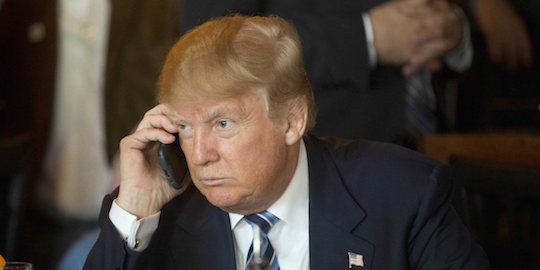Alert reader/covert breeder John Smick sent me this passage from the transcript of a New York Times interview with Donald Trump. The story that emerged from that interview, in July, focused on his now-infamous refusal to commit to defending NATO allies. But he also had this to say about the importance of cybersecurity:
But certainly cyber has to be a, you know, certainly cyber has to be in our thought process, very strongly in our thought process. Inconceivable that, inconceivable the power of cyber. But as you say, you can take out, you can take out, you can make countries nonfunctioning with a strong use of cyber.
The management would like to remind you that this man is 70 years old. Close reading after the jump.
I’m going to say that if you asked Trump whether American citizens had a right to strong encryption, he would see a good-looking woman behind you. He appears to know little about information security, and probably computers in general. He is definitely bullshitting in the passage above.
The major tell is that he refers to all issues related to networked computing as “cyber,” a habit that dates him in roughly the same way as my grandfather saying “watch the TV.”1 No one who knows what they’re talking about says cyber. I am not a software engineer, but if I had to pose as one I’d carefully avoid saying “cyberspace,” “cyberwar,” “cybermail,” et cetera. Trump’s diction immediately reveals he is faking it here, like an undercover cop who asks where to buy grass.
You can also tell he doesn’t know what he is talking about because he goes to one of his favorite tricks. When he is playing for time, as he does in the first sentence of this quote—“But certainly cyber has to be a, you know, certainly cyber has to be in our thought process, very strongly in our thought process”—he asserts that whatever he is talking about is important. It’s adverbially important, this thing of which he is about to, in just a second here, demonstrate his knowledge. But in this case, it’s so important he’s going to need to think about it even longer. “Inconceivable that, inconceivable the power of cyber,” he says. You get the feeling that for him, this statement is literally true.
And can we blame him? The man is seven decades old. He precedes the Hell’s Angels. The modern world already made him adjust to birth control pills. Are we really going to make him learn how IP spoofing works?
Yes, if we are going to make him president. He is going to have to learn all kinds of crazy stuff, much of it presumably more complicated than configuring a router. And yet, an ordinary man of 70 cannot kindly be expected to know how to turn off keyboard clicks on his phone. This brings us close to a dangerous idea: maybe some people are too old to be president.
I don’t want that to be true. My friend Susan Adler is one of the canniest people I know, and she is also among the oldest. But perhaps wits have less to do with it than the human’s finite ability to learn new systems. My mom is much smarter than Donald Trump, but she’s not exactly an OS X power user. By the time she got to that, she had learned too much other stuff.
For the Republican nominee for president, that seems less of a danger. Still, he never learned to accept hair loss or disguise his prejudices—why would he now learn how China might covertly introduce errors into US shipping schedules?
Fortunately, we don’t have to consider these difficult, potentially ageist questions, because Trump would be unqualified for the presidency at age 50. He is very old, but mostly the problem is that he doesn’t know anything. He’s spent his whole life negotiating deals, making money by talking to people about money. This may explain the origins of his go-to bluff. If nothing else can be said about money, it is important.
That is the central proposition of the Trump campaign, right? That the person with the most money is the smartest, because that’s what’s really important? Cyber, yeah—it’s inconceivable how important that is. But I’ll take care of it. I know how to do all the important things, because I’m rich.




